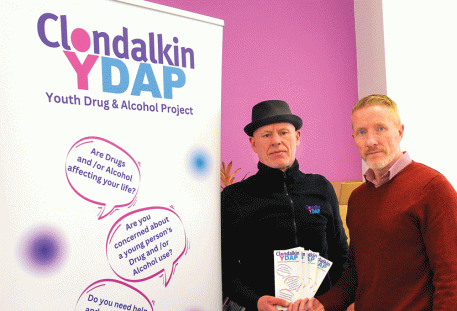Our Aims
-
Our Mission
To re-establish and strengthen the role of the community in tackling the causes and consequences of drug and alcohol misuse; facilitate the re-establishment of meaningful and effective partnerships; and support the development of a holistic approach to dealing with both the causes and consequences of drug and alcohol misuse in the CDATF area.
Our Values
Community Development Approach
- Enabling and supporting groups of people most affected to develop knowledge; skills and confidence so that they can develop an analysis, identify priority needs and issues and address these through collective action.
- The active engagement and participation of individuals and groups who experience social exclusion, marginalisation and discrimination in decision making, planning and action at all levels, from the local to the global.
- Empowerment of individuals and communities and working with people to enable them to become critical, creative, liberated and active participants in taking more control of the direction of their lives.
- The active pursuit of social justice and the development of a socially cohesive society.
- Challenging the oppression and exclusion of individuals and groups by institutions and society based on ability, age, culture, gender, marital status, socioeconomic status, nationality, skin colour, racial or ethnic group, sexual orientation, political or religious beliefs.
Person-Centred Approach
- Investing time and effort in listening to and understanding personal circumstances and challenges.
- Recognising difference and uniqueness, avoiding the potential for generalising about circumstances and needs.
- Demonstrating compassion, empathy and a duty of care.
- Offering people, the chance and the space to understand the causes of their own challenges with drug or alcohol misuse and not just the consequences.
- Providing professional and effective support, engaging in advocacy where appropriate and at all stages promoting self-determination.
- Working in a non-judgemental way and opposing all forms of prejudice.
Human Rights Based Approach
- Treating people as people: defining people by who they are and not what their problems are.
- Recognising the entitlement of everyone to a high level of service provision.
- Recognising the constitutional rights of all as citizens.
- Promoting respect and facilitating the right to feel safe.
- Promoting respect and facilitating the right to question.
- Promoting respect and facilitating the right to self-direction and choice.
- Promoting respect and facilitating the right to have privacy respected.
- Promoting respect and facilitating the right to be represented.
- Encouraging and promoting collective responsibility.
- Upholding the right to in‑influence local decisions and local decision-makers (across a range of policy issues and not just related to drug and alcohol misuse).
- Acknowledging the potential for conflicting rights in any situation (and the consequent need for mediation in many situations)
Evidence Based Approach
- The CDATF are committed to working in an integrated way by working to ensure that three goals at the centre of our plan are very much interrelated.
- Success in positively influencing mainstream responses will depend greatly upon knowledge and lessons emerging from activities under the other two goals. Equally, there is a limit to effectiveness in achieving Goals 1 and 2 without efforts to influence mainstream services being integral to all activities.
- We place great importance on the role of evidence in establishing links between the goals, maintaining overall coherence, and contributing to real and sustainable change. Actions will be delivered under each of the goals and will form an essential component of the CDATF’ work in terms of the development and implementation of action plans. Most importantly, a framework will be agreed which will ensure that evidence of what was achieved and how it was achieved is collected and assessed on an ongoing basis. This will provide the basis for continuous interaction and negotiation with service providers and policy makers to take place on an informed basis.
- Research supported or initiated by the Task Force will be within the action-research model: always aiming towards the successful achievement of Goals 1 and 2, and spelling out implications for the achievement of Goal 3.
Our Goals
- Deal with the effects of drug and alcohol misuse.
- Strengthen the role of the community in addressing the causes of drug and alcohol misuse.
- Positively influence mainstream services and contribute to more integrated responses.
See pages 16 – 20 of CDATF-Strategic-Plan-2018-2025 for more detail if required
Overview
In our Community section you can find out about the History of Clondalkin, Early Demographic Profile, Emergence of Opiate Use and Community Response, our Catchment Area and Strategy Response.
Find out MoreOur Community
In our Community section you can find out about the History of Clondalkin, Early Demographic Profile, Emergence of Opiate Use and Community Response, our Catchment Area and Strategy Response.
Find out MoreOur Organisation
In our Organisation section you can find out more about our team and view details on our organisational structure. Click on the button below to find out more.
Find out MoreLatest News
- Pinned

Drive Project
Drug related intimidation and violence is a serious and frightening problem that is affecting individuals,... - Pinned

#kickthevape vaping campaign
#kickthevape Background In Ireland over recent years there has been a significant increase in the... 
Youth drug and alcohol project plays a huge role in community
“THERE is a huge need for the Youth Drug and Alcohol Project (YDAP) service, we...
Training
We provide a variety of training programmes around addiction, drug and alcohol support to schools, community workers and healthcare professionals.